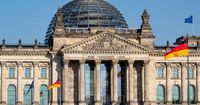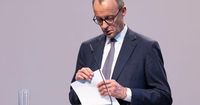Germany is entering a new political era as the centre-right Christian Democratic Union (CDU), led by Friedrich Merz, finalizes its coalition agreement with the Social Democrats (SPD). After a swift negotiation process that began following the February 23, 2025 election, the coalition announced its plans on April 9, 2025, focusing on economic revitalization and increased defense spending amidst growing global uncertainties.
Merz's victory at the polls, where his party secured 28.5% of the vote, came at a time when Germany's economy is teetering on the brink of recession, facing potential tariffs from the United States that could impact €161 billion of annual exports. The coalition's agreement aims to counteract these economic pressures with a comprehensive reboot of fiscal policies.
In his presentation of the coalition agreement, Merz emphasized the need for Germany to "move the country forward again," a sentiment echoed in the 144-page document that outlines plans to significantly boost defense spending. The agreement reflects a consensus that Germany must prepare for a future where U.S. commitments to European security under President Donald Trump remain uncertain. "Germany is back on track," Merz declared, signaling a return to a more assertive German role in both European and global affairs.
With the backdrop of rising geopolitical tensions, particularly regarding Russia's ongoing conflict in Ukraine, Germany's new government has pledged to continue supporting Ukraine. The coalition agreement states, "We will provide comprehensive support to Ukraine so that it can effectively defend itself against the Russian aggressor and assert itself in negotiations." This commitment underscores the urgency felt by both parties in the coalition to bolster Germany's defense capabilities.
However, the coalition's formation does not come without challenges. The rise of the far-right Alternative for Germany (AfD), which garnered 20% of the vote in the recent election and is now polling as the most popular party at 25%, poses a significant threat to the stability of the new government. Political analysts, such as Wolfgang Schroeder from Kassel University, have noted that the swift conclusion of coalition talks was largely driven by external pressures, including the influence of Trump and the growing support for the AfD.
Merz's coalition has also committed to addressing domestic issues, particularly migration. He has stated that his government will "largely end irregular migration," promising to implement stricter border controls and a "repatriation offensive" targeting undocumented immigrants. This hardline stance on immigration reflects the growing concerns among the electorate regarding border security and social cohesion.
As the coalition prepares to take office, Merz faces the daunting task of managing a fragmented political landscape while also addressing the pressing economic challenges posed by U.S. tariffs and the potential for further trade disputes. The coalition agreement outlines plans to relax Germany's strict debt brake and inject hundreds of billions of euros into infrastructure development and defense.
Despite these ambitious goals, the new government is entering a period of uncertainty. The previous coalition, led by Olaf Scholz, was criticized for its inability to respond effectively to the challenges facing Germany, leading to perceptions of political paralysis. Merz's coalition must demonstrate its capability to govern effectively in a time of crisis, or risk losing public confidence to the AfD.
Markus Söder, a prominent political figure in the coalition, humorously remarked that Germany is about to get a "new fitness trainer," indicating a shift towards a more proactive and decisive government. As the new administration is expected to be sworn in during the first week of May, the stakes have never been higher for Germany and Europe.
In conclusion, the coalition led by Merz represents a significant shift in German politics, with a focus on revitalizing the economy and enhancing national security. However, the challenges posed by the AfD and the broader geopolitical landscape will require careful navigation and decisive action from the new government. As Merz prepares to take the helm, all eyes will be on Germany to see if it can indeed reclaim its position as a leader in Europe.







